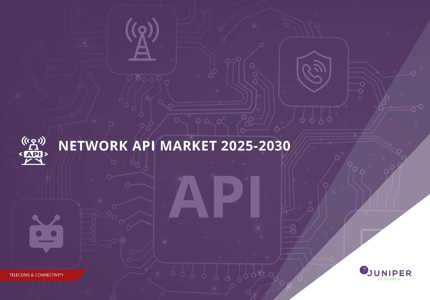Network APIs: Why Operators Should Be Optimistic
When the GSMA Open Gateway first launched in at Mobile World Congress in February 2023, there was significant hype surrounding network APIs and their potential to turn into a major revenue stream for mobile operators.
However, since network APIs were launched, the market has been slow to emerge.
Operators are still working to build their network API offerings. Operators are currently focusing on deploying network APIs such as SIM swap and number verification, and scaling their capacity, rather than generating revenue. In fact, even if an operator establishes a suite of network APIs, they will struggle to monetise them.
This is as network APIs are not something operators can perform on their own. While in the future there may be exceptions, at present to have value, network APIs are only beneficial if they can provide sufficient coverage.
For example, there is limited value for enterprises in a SIM swap API that only covers 30% of a population in a given country, as the API is unable to authenticate the majority of users. Similarly, a device location API that cannot provide the location of an IoT device if it switches to another operator network is limited. Operators can only provide network APIs for their own mobile subscribers, and therefore are dependent on other operators in the market to also provide the same APIs. This means that the network API is unlike other telecommunications markets such as 5G, where a single innovative operator can drive revenue growth on their own.
This is also true globally, with Juniper Research believing that the roll-out of network APIs around the world will increase the value of existing network API deployments, with consistent coverage across borders allowing for wider adoption and cross-border use cases. For example, an eCommerce platform may not adopt number verification if they can only use it in a couple of markets, but if they can use it in most of their markets, the platform will be much more likely to invest in the new verification method. The value of networks APIs to developers and enterprise is heavily influenced by the coverage provided by other operators alongside their own API.
Why Operators Should Be Optimistic
APIs offer a significant opportunity for operators to increase their average revenue per connection. However, Juniper Research believes that operators must be realistic about future revenue, as we forecast that billions in revenue will be generated by the channel over the next five years.
Once a core suite of APIs is established amongst operators throughout a country or region, CPaaS players and other channel partners will be in a strong position to deliver network APIs to their developers or provide end-to-end solutions based on network APIs. This will accelerate market adoption, and thus grow revenue, with common API access across operators being critical to enabling global solutions.
At present, the network API market is highly concentrated on authentication and anti-fraud, with SIM swap and number verification emerging as two of the most important network APIs. Juniper Research expects this to continue over the next five years, with authentication and anti-fraud forming the bedrock of the network API market. APIs such as number verification represent the next era of authentication provided by operators, and if mobile operators do not embrace these solutions, they will increasingly lose ground to non-telecommunications channels such as WhatsApp.
Having a Startup Mentality
Juniper Research believes that operators must refocus their traditional market strategies in favour of strategies that are reminiscent of many technology startups. Operators’ focus on the network API market must be on market building. Like a startup, operators need to focus introducing developers and enterprises to their network APIs and build a userbase. This will require investment in education for developers and simplification, as well as effective use of partnerships with major channel partners. Network vendors, CPaaS providers, and hyperscalers will all be critical to engaging with developers, as well as providing aggregated access to network APIs.
Juniper Research also believes that operators must ensure their pricing models do not hinder further market adoption. Operators cannot be overly focused on charging a premium, instead adopting business models that promote user growth must be established instead. Revenue will follow user acquisition, and operators need to first establish the market for their services.
Operators must also focus on building their suite of APIs prior to focusing on monetisation. Operators cannot expect to launch a single API and see significant revenue. A suite of different APIs which partners, developers, and enterprises can choose from needs to be established for significant growth. Developers want to have flexibility and choice in their APIs, which requires a suite of APIs that allows developers to couple different APIs with one another to address their specific use cases. For example, number verification and SIM swap could be required to meet the needs for a developer. If only number verification is available, then the developer is likely to look elsewhere.
Juniper Research recommends that operators initially focus on developing authentication and fraud prevention to establish a presence in the market. Every company needs some form of authentication and fraud prevention, especially with the growing threat of fraud and the high demand for more effective forms of authentication and anti-fraud measures. Juniper Research notes that operators already have a presence in this area as well, with services such as SMS one-time passwords. These authentication and fraud prevention API scans will then be expanded on with APIs such as Location Services, Device Information, and Communication Quality, which Juniper Research believes will play an ever more important role in the network API market.
Alex is a Senior Research Analyst in Juniper Research’s Telecoms & Connectivity team, focusing on the latest developments in operator and telecommunications markets. His recent reports include Networks APIs, Cellular IoT, and International Roaming Corridors.
Latest research, whitepapers & press releases
-
 ReportFebruary 2026Telecoms & ConnectivityMobile Messaging Market: 2026-2030
ReportFebruary 2026Telecoms & ConnectivityMobile Messaging Market: 2026-2030Juniper Research’s Mobile Messaging research suite provides mobile messaging vendors, mobile network operators, and enterprises with intelligence on how to capitalise on changing market dynamics within the mobile messaging market.
VIEW -
 ReportFebruary 2026Fintech & PaymentsKYC/KYB Systems Market: 2026-2030
ReportFebruary 2026Fintech & PaymentsKYC/KYB Systems Market: 2026-2030Our KYC/KYB Systems research suite provides a detailed and insightful analysis of an evolving market; enabling stakeholders such as financial institutions, eCommerce platforms, regulatory agencies and technology vendors to understand future growth, key trends and the competitive environment.
VIEW -
 ReportFebruary 2026Telecoms & ConnectivityRCS for Business: 2026-2030
ReportFebruary 2026Telecoms & ConnectivityRCS for Business: 2026-2030Our comprehensive RCS for Business research suite provides an in‑depth evaluation of a market poised for rapid expansion over the next five years. It equips stakeholders with clear insight into the most significant opportunities emerging over the next two years.
VIEW -
 ReportFebruary 2026Fintech & PaymentsMobile Money in Emerging Markets: 2026-2030
ReportFebruary 2026Fintech & PaymentsMobile Money in Emerging Markets: 2026-2030Our Mobile Money in Emerging Markets research report provides detailed evaluation and analysis of the ways in which the mobile financial services space is evolving and developing.
VIEW -
 ReportJanuary 2026IoT & Emerging TechnologyPost-quantum Cryptography Market: 2026-2035
ReportJanuary 2026IoT & Emerging TechnologyPost-quantum Cryptography Market: 2026-2035Juniper Research’s Post-quantum Cryptography (PQC) research suite provides a comprehensive and insightful analysis of this market; enabling stakeholders, including PQC-enabled platform providers, specialists, cybersecurity consultancies, and many others, to understand future growth, key trends, and the competitive environment.
VIEW -
 ReportJanuary 2026Telecoms & ConnectivityMVNO in a Box Market: 2026-2030
ReportJanuary 2026Telecoms & ConnectivityMVNO in a Box Market: 2026-2030Juniper Research’s MVNO in a Box research suite provides Mobile Virtual Network Enablers, Mobile Virtual Network Aggregators, and other players with detailed analysis and strategic recommendations for monetising demand for MVNO in a Box services.
VIEW
-
 WhitepaperFebruary 2026Telecoms & Connectivity
WhitepaperFebruary 2026Telecoms & ConnectivityHow Social Media Will Disrupt Mobile Messaging Channels in 2026
Our complimentary whitepaper, How Social Media Will Disrupt Mobile Messaging Channels in 2026, explores the challenges and opportunities for operators and enterprises as social media traffic continues to increase.
VIEW -
 WhitepaperFebruary 2026Telecoms & Connectivity
WhitepaperFebruary 2026Telecoms & ConnectivityProtecting Users from Scam Ads: A Call for Social Media Platform Accountability
In this new whitepaper commissioned by Revolut, Juniper Research examines how scam advertising has become embedded across major social media platforms, quantifies the scale of user exposure and financial harm, and explains why current detection and enforcement measures are failing to keep pace.
VIEW -
 WhitepaperFebruary 2026Fintech & Payments
WhitepaperFebruary 2026Fintech & PaymentsKnow Your Agents (KYA): The Next Frontier in KYC/KYB Systems
Our complimentary whitepaper, Know Your Agents (KYA): The Next Frontier in KYC/KYB Systems, examines the state of the KYC/KYB systems market; considering the impact of regulatory development, emerging risk factors such as identity enabled fraud, and how identity and business verification is evolving beyond traditional customer and merchant onboarding toward agent-level governance.
VIEW -
 WhitepaperFebruary 2026Telecoms & Connectivity
WhitepaperFebruary 2026Telecoms & Connectivity3 Key Strategies for Capitalising on RCS Growth in 2026
Our complimentary whitepaper, 3 Key Strategies for Capitalising on RCS Growth in 2026, explores key trends shaping the RCS for Business market and outlines how mobile operators and platforms can accelerate adoption and maximise revenue over the next 12 months.
VIEW -
 WhitepaperFebruary 2026Fintech & Payments
WhitepaperFebruary 2026Fintech & PaymentsThe Next Steps for Mobile Money – Interoperability and Openness
Our complimentary whitepaper, The Next Steps for Mobile Money – Interoperability and Openness, analyses how interoperability and open platforms can drive new growth opportunities through partnerships with key stakeholders.
VIEW -
 WhitepaperJanuary 2026IoT & Emerging Technology
WhitepaperJanuary 2026IoT & Emerging TechnologyPreparing for Q-Day: Post-quantum Security Shift
Our complimentary whitepaper, Preparing for Q-Day: Post-quantum Security Shift, assesses the factors which are increasing interest in adopting PQC, and challenges to PQC adoption. Additionally, it includes a forecast summary of the global spend on PQC by 2035.
VIEW
-
Telecoms & Connectivity
MVNO Subscriber Revenue to Exceed $50 Billion Globally in 2030
March 2026 -
Fintech & Payments
QUBE Events is excited to bring back the 24th NextGen Payments & RegTech Forum - Switzerland
February 2026 -
Telecoms & Connectivity
OTT Messaging Apps to Exceed 5 Billion Users Globally by 2028; Driving Shift in Enterprise Communication Strategies
February 2026 -
Fintech & Payments
Calling All Fintech & Payment Innovators: Future Digital Awards Now Open for 2026
February 2026 -
Telecoms & Connectivity
Operator RCS for Business Revenue to Reach $3 Billion Globally by 2027, Growing 150% in Two Years
February 2026 -
Fintech & Payments
KYC & KYB Systems Spend Outside Financial Sector to Grow 105% by 2030 Globally, as KYC Moves Beyond Banking
February 2026

























